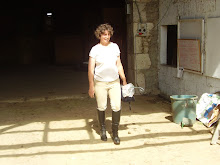In a TPRS class the teacher can ask one of the students to retell the story.
Generally we do this after we have asked the story and the students have been hearing the targeted structures repeated over and over again. We never ask students to retell the story unless we are sure that they are ready. This is in line with the principle that you should not ask a student to do something unless you are sure that he will succeed in the task.
Retelling the story allows students to hear it one more time, giving them more comprehensible input and giving the big picture after having circled all the details. Often the teacher herself retells the story. She can pretend to have forgotten parts of the story, so the students fill in whenever she stops and looks puzzled. Or she can deliberately make mistakes that the students correct.
Asking students to retell the story allows the teacher to listen to their emergeant language and see which structures students are using easily, that is which have been acquired. Structures that don't appear in the retelling or which students struggle with will need more repetition.
Retelling is production, but it is sheltered production, since the student is asked to use language that he has heard repeated many times. It should give the student confidence in his ability to use the language and should never be a cause of stress.
There are several ways of retelling the story. If you have a few good, solid superstars, you can invite one of them to retell the story. Or let two of them tell the story as a team.
I have asked students to do a chain retell.* One student gives the first sentence of the retell, the next student repeats the first sentence and adds one. The third student repeats the first two sentences and adds one, and so on until the last student gives the complete summary of the story. This type of retell gives a maximum number of repetions. When the teacher smiles and encourages the students, they become braver and they can also help each other out when someone falters. It should be a group effort.
Some classes found retelling difficult to organize. I would then ask all the students to stand up and ask each student to say one sentence about the story, anything at all that they remembered, without worrying about where it might come in the order of events. I would call a student and he would propose his sentence. (If the grammar was not correct, I would echo the sentence back, as if I was repeating what he had said, but in a correct form.) I would then listen to the next student and decide which sentence came first in the events of the story and ask the two students to stand in that order and repeat their sentences. After hearing the third student, we would decide where he should stand. When all the students had proposed a sentence, they were basically standing in the right order for a retell and I would ask them to repeat their sentences in order. If we didn't agree about the order, we had to ask students to repeat their sentences again to decide who should come first. I found that this method worked well with the weaker classes where students lacked the confidence to attempt a retell on their own. In this manner the students had only to say their own sentence, but listening to the others they heard the necessary repetitions.
Retelling the story is also excellent preparation for reading the story.
* (Originally the chain retell was a getting-to-know-each-other game I used on the first day of school. When I had fewer than fifteen students I had them sit in a circle and I sat in the circle with them. Then I would ask the student next to me his name, where he was from, his favorite sport or activity, if he had a pet. Once I had the information I wanted, I asked the next student to tell us about the first and to introduce himself. The third student told about the first two and introduced himself. As we went around the circle, each student had to present all the others and himself, until we reached the last student who had to tell about everyone in the group. Of course the last person in the group was me, and the students would listen very attentively to see if I actually remembered their name.)
Tuesday, November 27, 2012
Subscribe to:
Comments (Atom)
